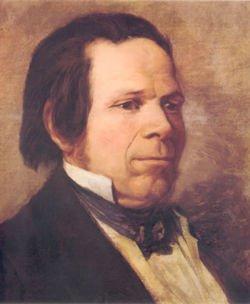Ignaz Schuppanzigh 1776 – 1830
April 24, 2009
 Ignaz
Schuppanzigh 1776 –
1830 was a violinist, friend and teacher of Ludwig von
Beethoven,
and leader of Count
Razumovsky’s private
string quartet.
Ignaz
Schuppanzigh 1776 –
1830 was a violinist, friend and teacher of Ludwig von
Beethoven,
and leader of Count
Razumovsky’s private
string quartet.
Schuppanzigh recommended homeopath Anton Georg Braunhofer to Ludwig von Beethoven because their mutual friend Nikolaus Zmeskall had been cured of his gout by homeopathy.
Schuppanzigh and his quartet premiered many of Ludwig von Beethoven’s string quartets, and in particular, the late string quartets. The Razumovsky quartet is considered to be the first professional string quartet. Until the founding of this quartet, quartet music was played primarily by amateurs or by professional musicians who joined together on an ad hoc basis.
Schuppanzigh was born in Vienna, son of a professor of Italian at the Theresian Military Academy. Before the age of 21, he had established himself as a virtuoso violist and violinist, as well as a conductor. He gave violin lessons to Ludwig von Beethoven, and they remained friends until Ludwig von Beethoven’s death.
Schuppanzigh’s dedication to quartet playing played a pivotal role in the transition of quartet performance and composition. Prior to Ludwig von Beethoven, the quartet repertoire could be performed competently by good quality amateurs and by professionals with few rehearsals.
Ludwig von Beethoven’s quartets introduced many new technical difficulties that cannot be completely overcome without dedicated rehearsal. These difficulties include synchronized complex runs played by two or more instruments together, cross-rhythms and hemiolas, and difficult harmonies that require special attention to intonation.
When Schuppanzigh complained to Ludwig von Beethoven about a particularly difficult passage, Ludwig von Beethoven is said to have remarked, “Do you believe that I think about your miserable fiddle when the muse strikes me?”
The Razumovsky quartet also premiered works by other composers. Franz Schubert dedicated his Rosamunde quartet to Schuppanzigh.
Schuppanzigh was reported to be a handsome youth, but in adult life became seriously obese. Ludwig von Beethoven composed a short, comic choral piece dedicated to him, “Praise to Fat” (“Lob auf den Dicken”). Toward the end of his life, Schuppanzigh’s fingers reputedly grew so fat that he was unable to play in tune.